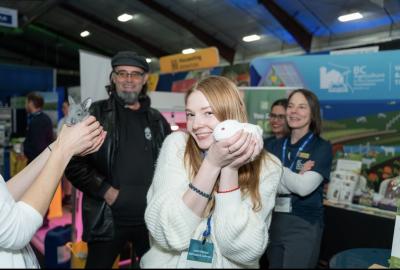
This article was originally published in the Arts Co-op Newsletter in Spring 2014.
As I’m penning this article I’m wrapping up my third semester here in Waterloo interning with the infamous BlackBerry who has become continuously visible in the media as strategic reviews and restructuring are underway. This year working for Blackberry has provided me with exciting opportunities to both observe and learn at close distance to the centre of action, and has convinced me that it is still worthwhile to obtain work experience with BlackBerry despite what you hear on the news.
My title is Statistical Methods Analyst, working primarily with the handheld software release management team, which supports the coordination of release activities across different domains to ensure software releases meet quality targets. A part of my responsibility is to help maintain and produce reports to support teams and senior executives in the decision-making process, and to monitor development, bugfix and run test activities. Early on in my Economics career I made the decision to focus on Econometrics after consulting with departmental advisors as well as those already in the field. It has meant a heavier-than-normal workload and a few more hours burying my head in numbers and equations, and familiarizing myself with Statistical language and software (such as ‘R’) and producing scripts to run regressions and doing other manipulations. But my efforts certainly paid off when the more technical nature of my courses opened up more possibilities and opportunities in my career choices. The nature and responsibilities of my role overlap very heavily with those of a quality assurance analyst, and those in Arts with an analytical head and a technical bent would find themselves very much qualified and ready for this kind of position if they plan their courses strategically
There is no such thing as a “typical day” in my position. Each day comes with new challenges and because of the changing business needs, analysis has to be done often on an ad hoc basis. Most tasks would involve going into the organization’s internal defect tracking system and pulling relevant information using some kind of query language. The data would then be manipulated using various statistical techniques with various tools to obtain quality information that supports various decision making processes. Because of the highly collaborative nature of our work and often involving other teams, a task would typically start with a meeting to obtain relevant information and requirements; specifics would then be determined which would eventually culminate in a deliverable to meet or exceed their expectations.
As the organization transforms itself students have the advantage of observing the impact of the various restructuring activities and how it affects team activities from a relatively safe position. As people watched the departure of some of their team members whom they’ve worked with, and in the face of such negative publicity in the media, nothing but their immense pride of working for such an iconic organization would keep them going and staying faithful to their duties. What has stood out to me is the importance of transparency and clear communication from the leadership which helps to stabilise and inspire confidence, especially during challenging times. Taking initiative, being versatile and adaptable are key to surviving a storm of such scale, and skills that you acquire on the side, even ones you do not consider relevant to your current position, could prove to be valuable to your own team as well as others in an ever-changing climate.
Beyond the Blog
-
For more opportunities like Timothy's, visit the SFU FASS co-op page!
















